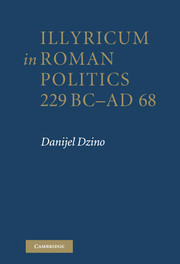Book contents
- Frontmatter
- Contents
- List of figures
- List of maps
- List of tables
- Acknowledgments
- Timeline
- 1 Introduction, approaches, review of sources and secondary literature
- 2 Illyricum in Roman foreign affairs: historical outline, theoretical approaches and geography
- 3 Roman trans-Adriatic engagement (229–168 BC)
- 4 Rome across the Adriatic in the late Republic (167–59 BC)
- 5 The construction of Illyricum: Caesar in Illyricum and the Civil Wars (59–44 BC)
- 6 Octavian in Illyricum
- 7 From senatorial to imperial Illyricum: Bellum Pannonicum
- 8 The failure of Greater Illyricum: the Bellum Batonianum
- 9 Iulio-Claudians in Illyricum: the tale of two provinces
- Conclusion: the construction of Illyricum in Roman political discourse
- Bibliography
- Index
4 - Rome across the Adriatic in the late Republic (167–59 BC)
Published online by Cambridge University Press: 05 May 2010
- Frontmatter
- Contents
- List of figures
- List of maps
- List of tables
- Acknowledgments
- Timeline
- 1 Introduction, approaches, review of sources and secondary literature
- 2 Illyricum in Roman foreign affairs: historical outline, theoretical approaches and geography
- 3 Roman trans-Adriatic engagement (229–168 BC)
- 4 Rome across the Adriatic in the late Republic (167–59 BC)
- 5 The construction of Illyricum: Caesar in Illyricum and the Civil Wars (59–44 BC)
- 6 Octavian in Illyricum
- 7 From senatorial to imperial Illyricum: Bellum Pannonicum
- 8 The failure of Greater Illyricum: the Bellum Batonianum
- 9 Iulio-Claudians in Illyricum: the tale of two provinces
- Conclusion: the construction of Illyricum in Roman political discourse
- Bibliography
- Index
Summary
‘Are you therefore mad, does my love not delay you?
Am I worth less to you, than chilly Illyria?’
Propertius, Elegies 1.8.1–2The relationship between the region which would become Illyricum and Rome, especially the legal position and status of the region in the later Roman Republic, is not entirely clear due to inadequate sources. It is often assumed by modern scholarship that Illyricum was either a province with ‘vague boundaries’, being outside a provincial zone as an independent protectorate, or administered from other provinces. Wilkes denied the existence of any meaningful regional policy in this period after the potentially dangerous Macedonian kingdom had been destroyed. Future Illyricum is represented as a strategic backwater where Romans fought only to train armies and provide triumphs for the imperatores, a place from which Romans were actually in retreat in the second and early first century BC. Most recently, in an extensive discussion of the sources, Šašel Kos summarised Roman Republican political conduct in the region until Octavian as an ad hoc reaction to the regional crisis. There was no meaningful, systematic conquest; the Romans were gradually establishing their direct and indirect control over parts of the region, as a consequence of their military interventions.
The trans-Adriatic conduct of Rome from the Illyrian wars to Caesar's pro-consulship recognised two different, but interrelated, zones in the eastern Adriatic. Thus, two contrasting Roman approaches to foreign affairs emerged: expansionism and hegemonism overlapped and complemented each other.
- Type
- Chapter
- Information
- Illyricum in Roman Politics, 229 BC–AD 68 , pp. 61 - 79Publisher: Cambridge University PressPrint publication year: 2010



